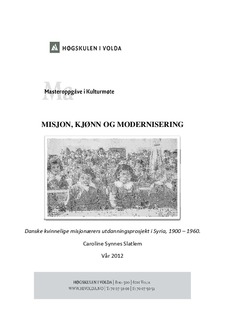Misjon, kjønn og modernisering. Danske kvinnelige misjonærers utdanningsprosjekt i Syria, 1900-1960
Master thesis
Published version

View/
Date
2012Metadata
Show full item recordCollections
- Kulturmøte [51]
Abstract
During the nineteenth and early twentieth centuries, Roman Catholic and Protestant missions spent an enormous amount of time, energy and money into activities directed towards women. In this Master Thesis, I have studied the female missionaries, Johanne Svanenskjold and Kamilla Skule, from the Danish missionorganisation, Østerlandsmissionen (ØM), and their educational work among “heathen” girls and women, 1900 – 1960. The thesis is a qualitative study based on different sources, such as books written by people who were related to the ØM or the mission work in the schools, letters from the missionaries to the mission magazines called Bring Lys and Østerlandsmissionens Kredsmeddelelse, lectures, minutes and private letters and a diary. The aim has been to examine how the Danish female missionaries conveyed the gospel to women by focusing on practical work in education, and if their work among women in Syria represented a change from the proselytizing – oriented evangelists. How did the different forms of governance in Syria affect the mission work of ØM? What characterized the relationship between evangelism and practical mission work? What image did the missionaries have on Syrian women? What characterized the womens work of ØM? And how was this contributing to the modernization of the country?
In Inger Marie Okkenhaugs studies of mission in Palestine, 1888 – 1948, she finds that, although the missionaries’ main aim was spreading the Christian message, most of the mission work was more social work. This became the accepted missionary activities, legetimised as the best way of reaching the local population. The same can be said about the Danish missionaries in early twentieth century Syria in my thesis. Despite working under three different governments, the Ottoman Empire, the French mandate and the Syrian independent state, the Danish mission managed to establish well-functioning schools and a hospital in Syria. Although, not all missionaries accepted this new approach, my sources finds that ØM received support from the mission board in Denmark through all the years in Syria. It was not until Syria became independent and the government sent out new school regulation, that the board in Denmark started questioning the evangelical work.
The mission work among girls and women was justified by images of women`s intellectual deprivation, domestic oppression and sexual degradation. The intention of female education was focused on the modernization of the domestic role by Christian influence, and to give girls a higher education so they could be trained as teachers and nurses to work in missionary establishment. The mission’s schools led to a growing acceptance for girl’s education, employment, liberation and equality for many Syrian women. My sources find that, despite having an evangelical goal, the mission work of ØM was more similar to welfare and social work